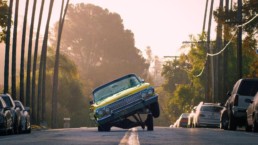‘G-Funk’ Review: Warren G’s Account of West Coast Gangster Rap
This rap icon biopic is unlike all the other rap icon biopics.
Making its hometown premiere in Los Angeles, the city whose roots were, in part, defined by the rise of ’90s rap music, is “G-Funk,” the biography of rapper Warren G and of West Coast gangsta rap. The film played at the Ace Hotel Theater in Downtown LA as part of the 2017 LA Film Festival.
The release of “G-Funk” comes at a time where other rap icon biopics have hit the big-screen. Films include the critically and commercially successful NWA biopic, “Straight Outta Compton” as well as this year’s (less-well received) Tupac Shakur biopic, “All Eyez on Me,” which may speak to the larger movement of the recognition of ethnically-marginalized peoples (Black Lives Matter), and real-life stories.
“G-Funk” re-tells the largely familiar story of the rise of hip-hop music on the US coasts at the end of the ’80s followed by the rise of rap music in the early ’90s. What sets this film apart is the emphasis on the subgenre from which it became – “G-Funk” (short for Gangsta Funk), and the people that put it on the map – including Snoop Dogg, the late Nate Dogg, and the film’s producer and creator, Warren G, whose careful supervision of how the story is told, and his portrayal, is evident.
“G-Funk” follows the influence that this one particular style of music had on American politics and culture at the end of the ’80s and early ’90s. In telling a story as familiar as this one, “G-Funk” had to overcome some obvious challenges: how do you tell yet another side of the rap movement, centered largely around a figure who might not be able to greenlight his own big studio movie, to a new generation of movie-goers?
In “G-Funk,” one of its very own members of that new generation was hired to bring Warren G’s vision to the big screen- 23-year-old director Karam Gill. Gill, a Chapman University graduate, may not have been born when G had made his contributions to the genre but was nonetheless hired to tell this all-encompassing story of rap, politics, culture, icons, and ultimately, the music.
[Karam] Gill might not have been the most obvious choice – an underdog, even, among his contemporaries – but he shows that he has both the drive and capability of realizing his vision and expressing his art. We learn that this is the type of role that Warren G played in the rise of G-Funk, as well.
One might wonder what Warren G saw in Gill that got him the job (Gill got the gig after attending one of Warren G’s concerts, asking the rap star if he could shoot video of his concert, which, after being reviewed, was evidence that he could capably direct this movie). And perhaps there’s an interesting parallel to be drawn between their pairing: Gill might not have been the most obvious choice – an underdog, even, among his contemporaries – but he shows that he has both the drive and capability of realizing his vision and expressing his art.
We learn that this is the type of role that Warren G played in the rise of G-Funk, as well.
We witness G’s earliest elementary school days, growing up with Snoop Dogg and Nate Dogg (MC-ing grade-school freestyles), through defining the G-Funk movement and later linking up with Dr. Dre (G’s step-brother) to create era-defining beats including Dr. Dre’s ‘The Chronic.’ “G-Funk” goes on to show the downfall of the genre – in the “Gangsta” lifestyle, filled with power struggles and politicking, with its guns, drugs, and gang-related violence so visibly captured in the East Coast vs. West Coast rap battles.
Along with Warren G and Snoop Dogg, Ice Cube, Russell Simmons, and Deion Sanders contribute their stories to this documentary, offering their insights over this time and movement and its place in history.
87 minutes. “G-Funk” is currently not rated and awaiting distribution.
Ryan Rojas
Ryan is the editorial manager of Cinemacy, which he co-runs with his older sister, Morgan. Ryan is a member of the Hollywood Critics Association. Ryan's favorite films include 2001: A Space Odyssey, The Social Network, and The Master.

